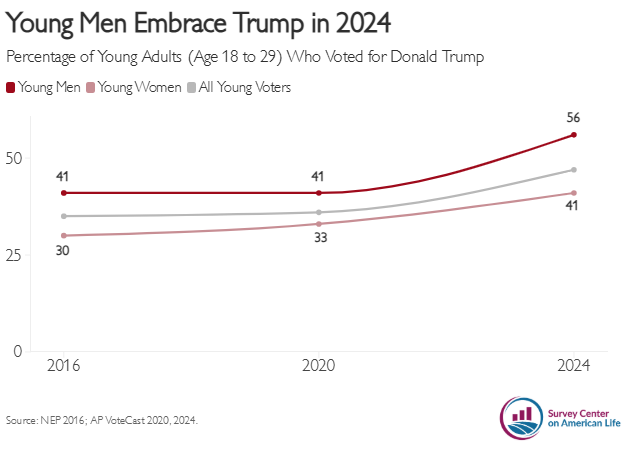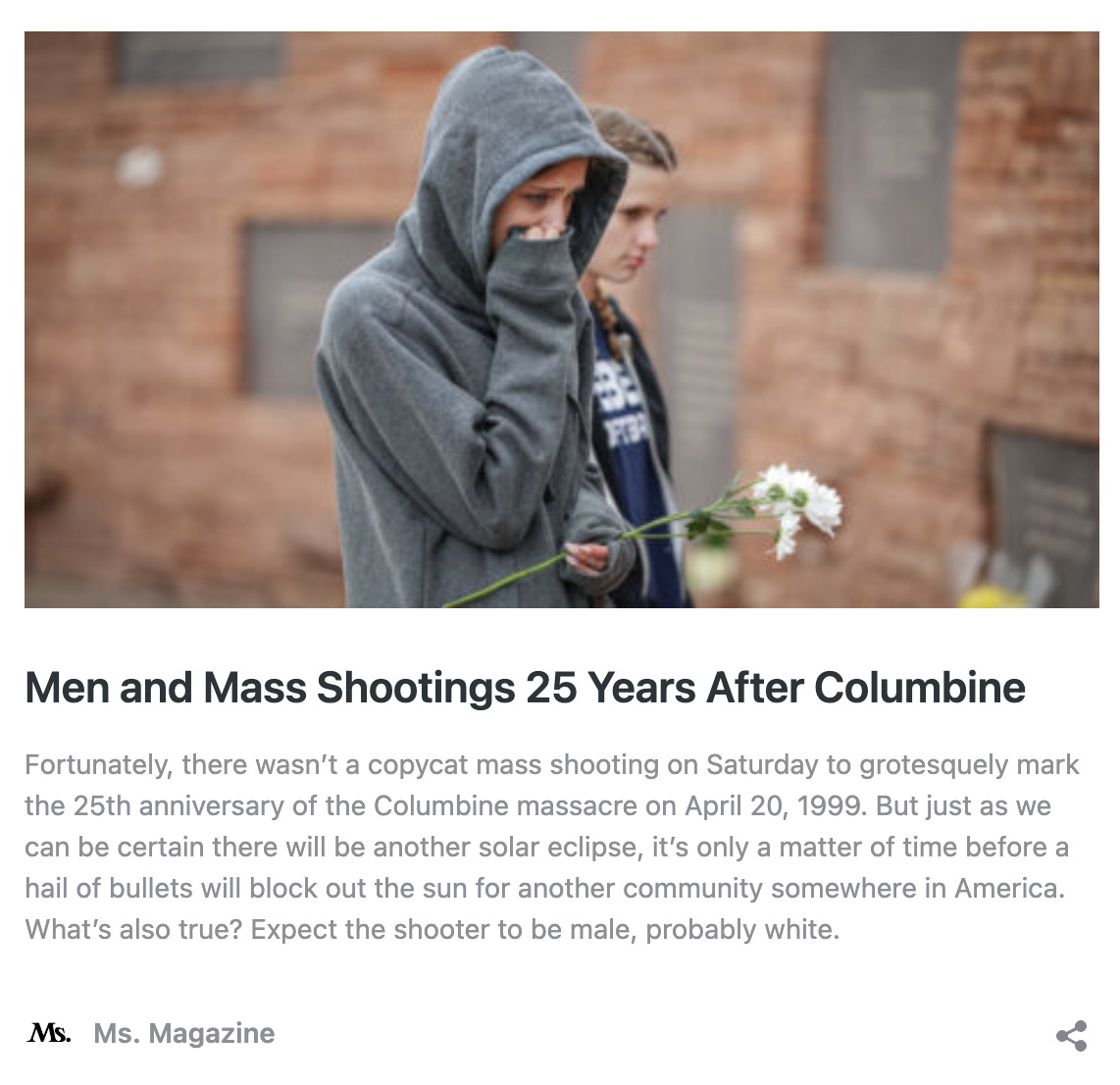There are moments during an interview when you know you have just heard something important. This happened during a recent interview with a student at the University of Texas. My colleague, Kelsey, asked Brad* how he was feeling about the 2024 election results:
“Among my peer group, there's a saying, and the saying is, we're so back... And that's sort of the sentiment among a lot of the people in my peer group with the election results, where it's like, everybody's very satisfied, everybody's very pleased.”
“We’re so back.”
One of the most notable—if not necessarily surprising—outcomes of the 2024 election was the massive gender divide among voters under 30. Young men voted for Trump over Harris by a wide margin. Fifty-six percent of young men voted for Trump compared to only 41 percent of young women. This represents a remarkable swing from four years earlier when a majority of both young men (56 percent) and young women (65 percent) voted for Joe Biden.
In voting for Trump, many young men were seeking to recover something they feel they have lost.
The Gender Disconnect in Views of Trump
One of the most fascinating aspects about listening to young men and women talk about Donald Trump is that it often feels like they are talking about two entirely different people. With Trump, many young women see a racist and misogynist who uses his power and position to demean other people—especially women. When young men talk about Trump, his abusive behavior and intemperate remarks rarely come up. At most, there is an acknowledgement that Trump is intemperate, but that his fortitude outweighs any of these liabilities.
In explaining why Trump appealed to so many young men, Brad thought it had a lot do with how Trump carried himself, and what he represented.
“Trump seems to be a real human being with a kind of vitality... who simplifies certain virtues, like courage and endurance... perseverance in the face of hardship."
“He has this sort of courage about him, and he's like a real man and a real person. And so that's deeply appealing to young men. It's not... a role model thing, but it's more like this is a real human being, right? And so, I can throw my weight behind him.”
In post-election interviews with young women, the responses are entirely different. Dani Colman, a student at the University of Michigan, was interviewed by Teen Vogue last month about Trump’s election. She was appalled by the result.
"Truthfully, I’m terrified. I’m shocked that sexual assault, fraud, and constant bullying was not a deal breaker to the majority of America.”
Or Cecilia Llamas at University of Miami, another young woman interviewed by Teen Vogue:
“I feel everything at once: anger, sadness, frustration, shock, and betrayal. I am gutted and ashamed for those who voted for him — a twice-impeached, convicted felon, and rapist who, above all else, undermines and threatens our democracy and planet.”
What’s remarkable in comparing the responses from young men and women is how often many of the young women will point to specific problems they have with Trump, while young men express their support in generalities.
Noah, an undergraduate student we spoke with from Claremont McKenna College in California, acknowledges Trump’s character flaws, but he still voted for him because of some vague promises.
"I hate the way he talks and the way he treats the presidency, the way he treats women and minorities and anybody and everybody—but nevertheless, I voted for him just because of some of the promises I saw in his administration."
Why don’t young men care about Trump’s abhorrent behavior? Because fundamentally they do not believe Trump is punching down. Many young men are told about the patriarchy and male privilege, but few believe they are living it, or that young women are so much more disadvantaged than they are. Many believe that gender inequality is a past problem rather than a current reality.
The national conversation around race, gender and sexuality has undergone a remarkable transformation over the past decade. In many of these debates, white men are cast as villains. I remember an article from Ms. Magazine on the anniversary of the Columbine massacre that sought to identify mass shootings not as a societal problem, but one reducible to the behavior of white men.
Many young men feel they are either singled out as the problem, or told they should serve as allies to other groups more worthy of help. In a society that has become obsessed with identity, Trump gives permission for young men to be proud of theirs.
Noah shares his view on this:
“But as for Trump as a figure, I think a lot of young men see him as, for lack of better words, a statesman in some way. He's a character with a strong belief. And I think a strong belief is what a lot of young men need to get behind because they don't see that. Specifically with men, they're told being a man is a problem. And so having a male figure who is just strong and loud and talks a lot and says whatever, that's someone that they can get behind.”
There is something tragic in all of this. Discrimination against women remains very real. My wife, who is on the smaller side, visited a neighbor in the hospital the other day, and while she was waiting in line two men in their 50s stepped directly in front of her. You might chalk it up as an honest mistake, but as she related to me with some exasperation: “It happens all the time!”
After it was clear that Trump won the 2024 election, misogynistic taunts exploded online. Far-right influencer and white nationalist Nick Fuentes posted “your body, my choice. Forever" to his near half a million followers on X (formerly Twitter). In the 24 hours following the election the phrase experienced a 4,600% increase on social media according to research conducted by the Institute for Strategic Dialogue. It's not only happening online. Young women have reported a variety of sexist behavior in the wake of Trump’s victory: one woman reported that a male friend dismissively told her, “Sorry, Trump won,” to shut her down.
Most young men are not engaging in this type of sexist behavior either online or off, but I think there’s probably a reluctance to speak out against this type of behavior too.
In a survey we conducted shortly after the election, young women reported more negative feelings about Trump’s election than young men, but the differences were surprisingly modest. About half of young women said they felt frightened (23 percent), disappointed (20 percent) or angry (6 percent) about Trump being elected president again. Young men were less bothered by the outcome. But few of them expressed much enthusiasm either. Only 13 percent of young men said they were excited about the prospect of a second Trump presidency.
I don’t think most young men endorse all of Trump’s erratic and offensive behavior. Why did so many of them vote for a bully? Maybe it’s because so many young men feel bullied, belittled, or disregarded in their own lives. And they see Trump as someone they know will never make them feel this way.
*Some names have been changed at the request of the interviewee.







Just continue this way please. Continue invalidating the feelings of young men with statements like "the Girls point to specific problems, the men to generic".
Just continue to validate the nonesense of micro discriminations like the situation in the line (as men cannot point out 100s of similar examples).
The extreme left. You have learnt nothing from this elections.
Good. We have Trump for a long time.
"Maybe it’s because so many young men feel bullied, belittled, or disregarded in their own lives. And they see Trump as someone they know will never make them feel this way."
Respectfully, Donald J Trump IS the perennial bully, dressed up in a business suit, that all little boys have ever had to stand down.
Any young man who feels that Trump understands him, empathizes with him, or will stand up for him is regrettably disillusioned, possibly misinformed, and hopelessly misdirected.
Bullies who get elected or appointed to the highest offices across the nations often leave legacies of harm, disrespect, inhumane behavior; and mostly they produce deeply embedded distrust into the systems they are employed to protect and steward.
Four years is a short season in light of eternity. Here on earth, four years can feel like an eternity.
But, as America has proven time and again, we The People will learn once again, we will vote locally, regionally, and nationally, and we WILL ultimately change our world for the better.
Despite the bullies and tyrants, and insecure little boys and girls who in fact -- really just need a hug.
God help America. We promise to Be better and Do better.